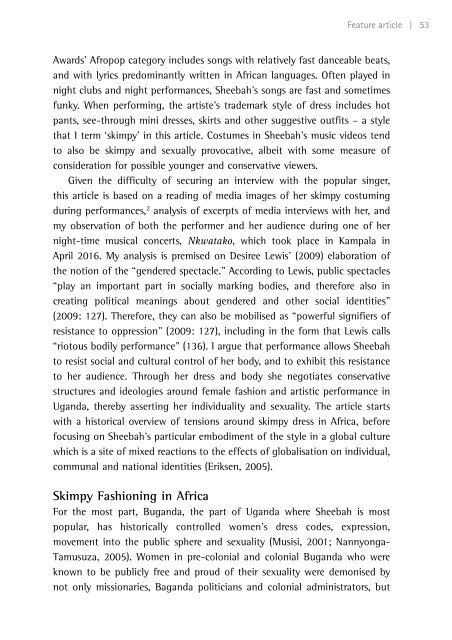The politics of fashion and beauty in Africa
fa21_proof_3
fa21_proof_3
Create successful ePaper yourself
Turn your PDF publications into a flip-book with our unique Google optimized e-Paper software.
Feature article | 53<br />
Awards’ Afropop category <strong>in</strong>cludes songs with relatively fast danceable beats,<br />
<strong>and</strong> with lyrics predom<strong>in</strong>antly written <strong>in</strong> <strong>Africa</strong>n languages. Often played <strong>in</strong><br />
night clubs <strong>and</strong> night performances, Sheebah’s songs are fast <strong>and</strong> sometimes<br />
funky. When perform<strong>in</strong>g, the artiste’s trademark style <strong>of</strong> dress <strong>in</strong>cludes hot<br />
pants, see-through m<strong>in</strong>i dresses, skirts <strong>and</strong> other suggestive outfits – a style<br />
that I term ‘skimpy’ <strong>in</strong> this article. Costumes <strong>in</strong> Sheebah’s music videos tend<br />
to also be skimpy <strong>and</strong> sexually provocative, albeit with some measure <strong>of</strong><br />
consideration for possible younger <strong>and</strong> conservative viewers.<br />
Given the difficulty <strong>of</strong> secur<strong>in</strong>g an <strong>in</strong>terview with the popular s<strong>in</strong>ger,<br />
this article is based on a read<strong>in</strong>g <strong>of</strong> media images <strong>of</strong> her skimpy costum<strong>in</strong>g<br />
dur<strong>in</strong>g performances, 2 analysis <strong>of</strong> excerpts <strong>of</strong> media <strong>in</strong>terviews with her, <strong>and</strong><br />
my observation <strong>of</strong> both the performer <strong>and</strong> her audience dur<strong>in</strong>g one <strong>of</strong> her<br />
night-time musical concerts, Nkwatako, which took place <strong>in</strong> Kampala <strong>in</strong><br />
April 2016. My analysis is premised on Desiree Lewis’ (2009) elaboration <strong>of</strong><br />
the notion <strong>of</strong> the “gendered spectacle.” Accord<strong>in</strong>g to Lewis, public spectacles<br />
“play an important part <strong>in</strong> socially mark<strong>in</strong>g bodies, <strong>and</strong> therefore also <strong>in</strong><br />
creat<strong>in</strong>g political mean<strong>in</strong>gs about gendered <strong>and</strong> other social identities”<br />
(2009: 127). <strong>The</strong>refore, they can also be mobilised as “powerful signifiers <strong>of</strong><br />
resistance to oppression” (2009: 127), <strong>in</strong>clud<strong>in</strong>g <strong>in</strong> the form that Lewis calls<br />
“riotous bodily performance” (136). I argue that performance allows Sheebah<br />
to resist social <strong>and</strong> cultural control <strong>of</strong> her body, <strong>and</strong> to exhibit this resistance<br />
to her audience. Through her dress <strong>and</strong> body she negotiates conservative<br />
structures <strong>and</strong> ideologies around female <strong>fashion</strong> <strong>and</strong> artistic performance <strong>in</strong><br />
Ug<strong>and</strong>a, thereby assert<strong>in</strong>g her <strong>in</strong>dividuality <strong>and</strong> sexuality. <strong>The</strong> article starts<br />
with a historical overview <strong>of</strong> tensions around skimpy dress <strong>in</strong> <strong>Africa</strong>, before<br />
focus<strong>in</strong>g on Sheebah’s particular embodiment <strong>of</strong> the style <strong>in</strong> a global culture<br />
which is a site <strong>of</strong> mixed reactions to the effects <strong>of</strong> globalisation on <strong>in</strong>dividual,<br />
communal <strong>and</strong> national identities (Eriksen, 2005).<br />
Skimpy Fashion<strong>in</strong>g <strong>in</strong> <strong>Africa</strong><br />
For the most part, Bug<strong>and</strong>a, the part <strong>of</strong> Ug<strong>and</strong>a where Sheebah is most<br />
popular, has historically controlled women’s dress codes, expression,<br />
movement <strong>in</strong>to the public sphere <strong>and</strong> sexuality (Musisi, 2001; Nannyonga-<br />
Tamusuza, 2005). Women <strong>in</strong> pre-colonial <strong>and</strong> colonial Bug<strong>and</strong>a who were<br />
known to be publicly free <strong>and</strong> proud <strong>of</strong> their sexuality were demonised by<br />
not only missionaries, Bag<strong>and</strong>a politicians <strong>and</strong> colonial adm<strong>in</strong>istrators, but



